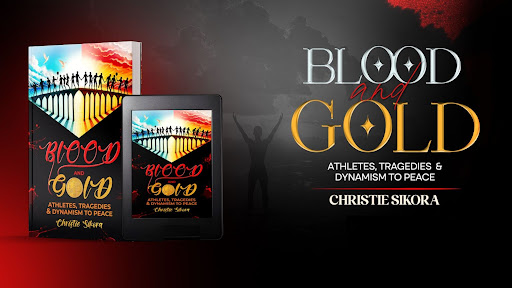Dubai, United Arab Emirates, 25th June 2025, ZEX PR WIRE, A powerful new book titled Blood and Gold by acclaimed author Christie Sikora has been launched this week, reigniting global conversations around the 1972 Munich Olympics and the way modern history is shaped, remembered, and often, deliberately forgotten. The book is being distributed globally with the support of international literary houses and is now available in the Middle East.

Unveiled in Dubai as part of its international rollout, Blood and Gold takes readers beyond the well-known headlines of the Munich tragedy to uncover a far more complex, human, and politically layered narrative. In a time where global attention remains fixed on conflict and displacement in the Middle East, the book lands with piercing relevance—raising questions about media framing, institutional failure, and the long-term consequences of unresolved history.
Sikora’s work revisits the 1972 Olympic Games, which were tragically marred when members of the Black September organization infiltrated the Olympic Village, taking eleven Israeli athletes hostage. The event, televised and immortalized in a single, haunting image of a masked man on a balcony, has long stood as a symbol of political violence. But Blood and Gold shifts focus to explore the deeper forces that led to the crisis—decades of Palestinian displacement, Western-backed territorial reshaping, and an Olympic environment designed more for spectacle than security.
Through extensive archival research and first-hand testimonies, the author challenges the moral clarity that has long defined global recollections of the incident. Rather than absolving or condemning, Sikora calls for nuance. The book asks difficult questions about why the voices of the displaced were never part of the international narrative and why the retaliation that followed, while applauded by some, failed to address the roots of the conflict.
Christie Sikora’s launch in the Gulf is deliberate. “The Middle East is central to this story, yet so often its people are excluded from how it’s told. This region deserves more than a single-frame portrayal of its past,” she said at the private launch event in Dubai. With a blend of literary storytelling and investigative depth, Blood and Gold reframes the Munich events not as a singular act of terror, but as the tragic culmination of global inaction, historical displacement, and institutional blindness.
The book also shines a light on the athletes themselves—not only the victims of the attack, but those from the U.S., Germany, and other nations who were caught in a Games marred by trauma. Sikora reveals how the decision to resume the Games just 34 hours after the last hostage was killed reflected not resilience, but a refusal to reckon with what had transpired.
As global interest grows around Blood and Gold, discussions are already underway for academic panels, regional book tours, and adaptations for documentary film. Its launch is not only a literary moment—it is being recognized as a historical intervention.
Now available across major bookstores and digital platforms, Blood and Gold is already being hailed as one of the most thought-provoking releases of the year. It does not seek to rewrite history, but to expand it—to make space for the silenced, the displaced, and the forgotten. And in doing so, it may finally allow the world to understand Munich not just as a moment of grief, but as a turning point in a story that remains unresolved.
The Book has been launched on Amazon with Hardcover, Paperback and Kindle editions to choose from.
For more information about Christie Sikora and her work, visit her official website: https://authorchristiesikora.com/.
Disclaimer: The views, suggestions, and opinions expressed here are the sole responsibility of the experts. No Economy Compare journalist was involved in the writing and production of this article.